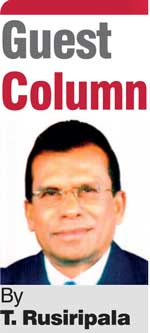Tuesday Feb 17, 2026
Tuesday Feb 17, 2026
Friday, 16 June 2017 00:00 - - {{hitsCtrl.values.hits}}
 We are aware that whistleblowing has been a source of information that has helped to bring out many wrongdoings open to the public, thereby enabling appropriate action against the perpetrators and sometimes to prevent something bad happening.
We are aware that whistleblowing has been a source of information that has helped to bring out many wrongdoings open to the public, thereby enabling appropriate action against the perpetrators and sometimes to prevent something bad happening.
We are also aware of instances where whistleblowing has been brought under internal procedures and regulations, thereby attributing a degree of authenticity to treat whistleblowing as an accepted policy. Nevertheless, it is alarming to note how top officials and higher authorities tend to shun this right and attempt to take punitive steps against whistleblowers.
Generally organised bodies such as registered trade unions resort to expose wrongs more liberally as a collective responsibility with or without any existing regulations or procedures granting such rights. Trade unions enjoy this right and it is an accepted fact that they have the freedom to express views and expose any wrongs in the interest of their institution or the members whom they represent. In one State bank, recently, the management contemplated to initiate disciplinary action against the officials of a recognised trade union for issuing an internal bulletin among its members over an issue concerning a much-disputed awarding of a contract violating the established norms and procedures. The trade union went to Court and obtained an interim injunction against this contemplated action. The bank then went to the Court of Appeal challenging this interim injunction but the Appeal Court upheld the lower Court’s decision and rejected the bank’s appeal.
This incident clearly brings out the interest of the high and mighty to prevent the free flow of information and how they intend to undermine whistleblowing. In another very recent instance, again in a bank with the State having a stake, an executive level employee who had exposed a fraudulent deal by a board member was interdicted adducing as the cause the delay on the part of the employee in reporting the matter. Thereby the subject matter was suppressed and the employee charge-sheeted unfairly, totally disregarding the fraud committed by the director. We are all aware how whistleblowing has helped to expose many hidden aspects in the Central Bank bond scam. Several reports that would have gone underground from the public domain came to light as a result of this whistleblowing.
The interested parties who were constantly playing up the issue thus got the opportunity to highlight them and focus public attention to the malpractices that were carried on under the patronage of the wrongdoers. Even in this instance the attention of the authorities was focused on the whistleblowers and not on the findings revealed by the reports. Whistleblowers have to be protected by social groups and civil society activists as people who render a service by exposing any information that would otherwise be unavailable to the public. The media especially has a duty to safeguard the whistleblowers.
Usually the kind of information will be on some activity deemed to be illegal, unethical or incorrect according to the policy of the organisation, be it public or private. The alleged wrong could be a violation of a declared policy or regulation, or about a threat to public interest. Sometimes it may even be on an issue concerned with a threat to security such as national security. Invariably the information will include fraud or corruption.
The whistleblower can bring out the allegations either internally or externally. When they focus or bring issues to the attention of other people within an organisation, it becomes an internal affair. This happens when some wrong is reported or brought to the notice of the seniors. Externally the allegations can be brought out through an outside third party such as media, law enforcement authorities, or Government. Sometimes the issues could be referred to those who are concerned.
Whistleblowers are invariably exposed to the risk of reprisal by the accused. The wrongdoers or the alleged resort to all kinds of threats. Litigation is a process usually used as the whistleblower could be singled out and subject to some harassment.
The resources available to the perpetrators of crime to defend themselves are rather scarce to the whistleblowers. Hence most whistleblowers wish to remain anonymous. Therefore facing legal action, criminal charges, social stigma and even the risk of losing one’s job or position are very much on the card for whistleblowers.
Whatever it may be, the whistleblowers brave to face such risks and come forward to serve the society in a public interest, standing high on ethical grounds and disregarding the vulnerability to retaliation and legal trouble.
Generally the right to whistleblow has a great importance in the financial world where things could be buried for ever leaving no trace or tell-tale mark of the wrong doer. It has to be borne in mind that in such instances what a whistleblower does helps to save public money which otherwise would end up in the amassed ill-gotten wealth accumulations of the culprits. Hence whistleblowing rights in the banking industry, in particular in the State sector, have to be protected. The media has to play a vital role sacrificing the easy money flowing into their income through advertising channels carefully manoeuvred by those interested more in suppressing whistleblowing!
(The writer can be reached via [email protected].)